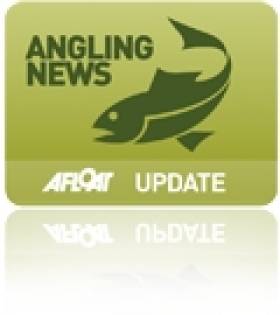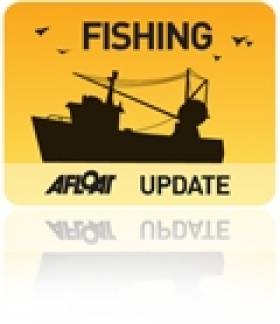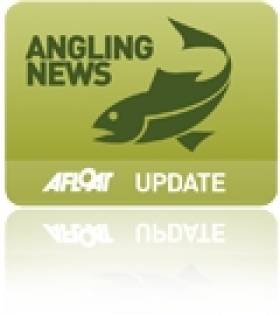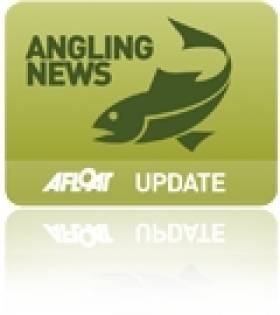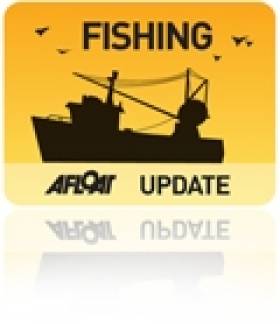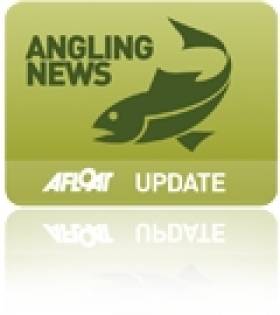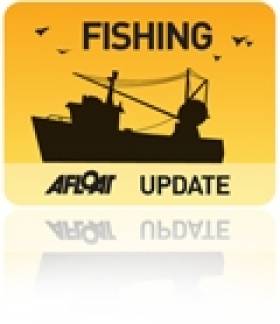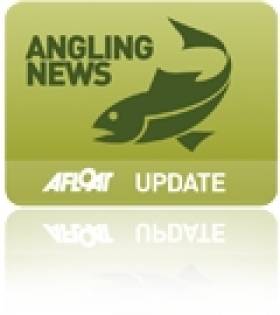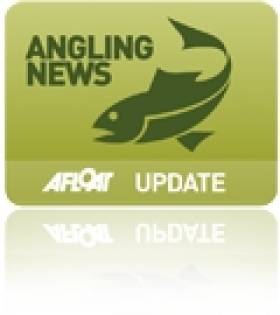Displaying items by tag: bass
#inlandfisheries– National policies for the management of trout, pike and bass, will be launched on Friday 22nd August by Inland Fisheries Ireland (IFI), the state agency responsible for the protection, conservation, management and promotion of Ireland's inland fisheries and sea angling resources.
The three policy documents have been formulated, through a rigorous consultation process, by groups comprising: fisheries scientists; angling federations; and industry representatives.
Speaking ahead of Friday's launch, IFI chairman, Mr Brendan O'Mahony, said, "The new policies mark a cornerstone for fisheries management in Ireland. They will have a very positive impact on the conservation and management of bass, pike and trout as well as ensure the sustainability of stocks into the future."
A prosecution taken by Inland Fisheries Ireland (IFI) and the Director of Public Prosecutions for illegal netting of bass at Helvic, Dungarvan Bay, Co Waterford resulted in a conviction and heavy fine for a Dungarvan man at a recent sitting of the District Court in Dungarvan. Mr. Adrian Healey pleaded guilty to three charges under Statutory Instrument (S.I.) 230 of 2006 (Bass Conservation of Stocks Regulations) and two charges under the 1959 Fisheries Act as amended.
Mr. Tony O Dwyer, an Inspector with IFI, outlined to Judge Finn that six IFI officers were involved in what was an ongoing investigation following several reports of illegal netting of bass and sea trout at night, off the Waterford coast. IFI officers were observing the coast at Helvic in an attempt to find if illegal netting was occurring. Mr. Healy was found in possession of a boat, a 426 yard net, 11 bass, 9 pollack and one mackerel at Helvic pier at approximately 0300 hours on the 5th of September 2013. Mr. Healy was co-operative when approached by IFI officers who seized the net and bass. Solicitor Burke who represented Mr. Healy outlined mitigating factors explaining that Mr. Healy had a small fish dealer business, Abbeyside Seafoods, which he was trying to get off the ground at the time and that he was under pressure with a young family and made a mistake which he admitted to. Mr. Healy no longer has this business. Mr. Burke also highlighted that net fishing for bass was not illegal in other European jurisdictions and that Mr. Healy's net was also automatically forfeited following the conviction.
Having heard the evidence Judge Finn convicted Mr. Healy and imposed fines totalling €4,000.00 and awarded legal expenses of €674.89 to Inland Fisheries Ireland. The three counts under SI 230 of 2006 have a maximum fine of €5,000 each if heard in the District Court while the two counts under the Fisheries Act have a maximum penalty €2,000 each or 6 months imprisonment if heard in the District Court.
Net fishing for bass is illegal and such activity has the potential to do huge damage to stocks. Securing a conviction for illegal netting at night takes significant resources and dedication of staff and such night time activity is usually undertaken in an attempt to evade apprehension by fisheries officers. The sale of wild Irish bass is also illegal and it is important the public do not support illegal fishing by buying these fish.
#Angling - Inland Fisheries Ireland (IFI) secured a conviction for illegal fishing in Waterford earlier this month over an incident last summer that quickly escalated from a fisheries investigation to a search and rescue operation.
Brendan Keane was prosecuted for illegal netting of bass in Tramore Bay on 25 August 2013 at a sitting of the District Court last Wednesday 2 May.
Keane, of Grantstown in Co Waterford, pleaded guilty to possession of a net, use of a boat while illegal fishing, and obstructing and impeding IFI officers, all contrary to the 1959 Fisheries Consolidation Act, and possession of nine bass contrary to a 2007 bye-law.
IFI inspector Tony O'Dwyer outlined in detail to Judge Kevin Staunton the complex series of events which unfolded when he and a colleague, with co-operation from the Garda, were investigating illegal netting of fish near Saleens, Co Waterford around 5am on the day in question.
O'Dwyer and fishery officer Isaac Ferns discovered Keane and an accomplice illegally fishing with a net and a small boat under cover of darkness in an area renowned by anglers for its stocks of salmon, sea trout and in particular wild bass, the sale of which is banned in Ireland.
When confronted, Keane began aggressively swinging an oar and roaring obscenities at the two IFI officers, and the court heard he was searching for his gun in the boat when the officers approached as he came ashore.
Keane and his accomplice retreated back to the open sea in their tiny unseaworthy boat, putting them in extreme danger. The tiny craft was not capable of dealing with the sea conditions and Keane had no buoyancy aid or lifejacket.
Gardaí involved in the incident said they were left with no choice but to alert the RNLI and Irish Coast Guard when what began as a fisheries investigation turned into a multi-agency marine search operation, including the deployment of a rescue helicopter when Keane's boat as round drifting without passengers.
Keane and his accomplice were subsequently found safely ashore but both refused to admit to gardaí that they had been the occupants of the drifting vessel.
IFI staff seized the small craft and a 120-metre drift net along with nine dead bass during the investigation.
Judge Kevin Staunton convicted Keane, imposing a four-month suspended sentence, with fines totalling €3,000, and awarding expenses of €751.02 to IFI. Keane’s boat and net were also forfeited.
Meanwhile in Galway, Judge Mary Fahy convicted two men of illegal fishing on the Clare River last summer at a sitting of Galway District Court on Tuesday 6 May.
James Fahy, of Ballindooley in Co Galway, was convicted of three offences on two dates in June and August 2013, while Michael McGath, of Castlegar in Co Galway, was convicted of one offence in August 2013.
Judge Fahy heard evidence from fisheries inspector Pat Gorman that on 18 June last James Fahy was observed using a net on the Clare River.
When approached, Fahy attempted to reverse his vehicle away down a side road, but fishery officers intervened. During the incident fishery officer Paul Reynolds was assaulted. Fahy was apprehended, and a search of the vehicle revealed a net, six large salmon and two large trout.
Fahy pleaded guilty to illegal possession of the fish, and to assault and obstruction. He pleaded guilty to a further charge of illegal possession of a net at the same location on 11 August, when he was again observed by fishery officers fishing and then concealing a net.
Judge Fahy convicted James Fahy and fined him €1,750 with €600 costs, and ordered him to pay €500 compensation to Reynolds. The judge also commented in court that illegal fishing hits already depleted fish stocks, and affects tourism.
She considered a driving disqualification in light of the use of the vehicle in the course of the offence, but as this was a first offence a driving ban was not imposed.
At the same court sitting, Michael McGath was convicted of illegal possession of a net on 11 August, and fined €100 with €600 costs.
National Bass Programme To Determine State Of The Species
#Angling - Inland Fisheries Ireland (IFI) has established a new National Bass Programme to collect data on bass in order to provide scientific advice to support management and conservation of Ireland’s only marine fish managed for angling.
According to IFI, the programme is being developed to determine the status of bass stocks and also to improve understanding of their ecology and biology in Ireland for the long-term sustainability of the species.
Commercial fishing for bass has been banned in Ireland since 1990, as Derek Evans outlines in his recent Irish Times column, following a dramatic decline of bass stocks in the 1980s.
The ban has not been without controversy, however, as our own Tom MacSweeney wrote last year of the farcical situation whereby other EU states have been allowed to fish for bass in Irish waters on a commercial scale, and even land their catch at Irish ports.
But this new programme could tell a more positive story of the health of bass in Irish waters, and pave the way for the future return of a commercial bass fishery in Ireland.
Details for anglers on how to take part in the programme by submitting bass scale samples are available on the IFI website HERE.
Illegal Bass Netting Prompts Multi-Agency Operation Near Tramore
#Fishing - A duo caught illegally fishing for bass off Tramore put themselves in "extreme danger" by going to sea in an unseaworthy boat.
Staff of Inland Fisheries Ireland (IFI) were working with the Garda investigating illegal netting of fish near Saleens in Co Waterford around 5am on Sunday morning last (25 August) when they came upon the tiny craft, which was not capable of dealing with the sea conditions, and had only one buoyancy aid for its two occupants.
IFI fisheries officers and gardaí were left with no choice but to alert the RNLI and Irish Coast Guard when what began as a fisheries investigation turned into a multi-agency marine search operation.
Thankfully the two people from the tiny craft were later found safely ashore. IFI subsequently seized the small craft and a 120m drift net, along with nine dead bass.
In a statement, IFI emphasised that fishing for bass is illegal, and that such activity has the potential to do huge damage to stocks.
The sale of wild Irish bass is also illegal, and it is important that the public does not support illegal fishing by buying such fish.
A file is being prepared by IFI with a view to prosecuting the fisheries offence.
IFI director David McInerney said it is incredible the risks that are undertaken by people undertaking water based activities.
The area in question is famous for having great stocks of bass and sea trout, but sadly has been the location for a number of tragic drowning’s in recent years.
Request For Assistance In National Bass Programme
#Angling - Inland Fisheries Ireland (IFI) has put out a request for assistance in its new National Bass Programme.
IFI has established the National Bass Programme to collect data on bass in order to provide scientific advice to support management and conservation of Ireland’s bass resource.
Bass is Ireland’s only marine fish species which is managed for angling.
The programme is being developed to determine the status of bass stocks and also to improve understanding of their ecology and biology in Ireland for the long-term sustainability of the species.
All assistance with the National Bass Programme would be greatly appreciated. If you would be interested in sending bass scale samples, the IFI can provide you with a scale envelope pack.
Bass Angling Feature on Tonight's 'Ear to the Ground'
#ON THE TV - Tonight's episode of Ear to the Ground on RTÉ One will feature a report on bass angling in Ireland, and the commercial fishing sector's efforts to re-open bass fisheries.
Among those interviewed for the feature were Dr Ed Fahy, who gave a talk at the recent Hook Bass Angling Festival discussing the threat to Ireland's sea bass should the fishery be opened to commercial interests, and argueing the case for bass angling tourism as a greater boon for the economy.
Ear to the Ground is broadcast tonight at 8.30pm on RTÉ One.
IFI Seizes Illegal Bass and Nets Off Waterford and Wexford Coast
#FISHING - Inland Fisheries Ireland has in the last week seized illegally caught bass off the Wexford coast and illegal fishing nets off the Waterford coast.
While the specifics of these cases are not being released for legal and operational reasons, IFI says that the successful seizures are the result of "the flexibility and dedication of IFI staff".
The national fisheries body said that these types of seizures are often initiated following significant covert, intelligence-led policing operations which are carried out during both day and night time.
In both instances off-duty fisheries staff were quickly mobilised to execute the seizures.
The regional director at IFI praised the staff involved in the operation and described the seizures as very important in the protection of Ireland’s bass, salmon and sea trout resource.
It is widely held that illegal coastal fishing could have devastating consequences on the nation's valuable fishery resource.
Dublin Tackle Shop Undertakes National Bass Survey
#ANGLING - Henry's Tackle Shop in Ballybough is conducting a countrywide survey to determine the extent of the decline of bass activity around Ireland's coastline.
According to the shop's Henry Lynam and Pat Daly, the last two years have seen some unusually low bass activity on many coasts.
As part of their national survey, they are asking anglers to return log book pages to measure the quality of the bass fishing across Ireland this year.
"Bass are a species protected by by-laws," they wrote on their blog. "The quality of protection afforded by these laws has varied but have mainly been sufficient to help the stock recover from a serious crash in the 1980s to a reasonable level over many years.
"We fear now that with the double edged sword of financial stress increasing the number of poachers and decreasing budget for fisheries protection that perhaps bass are coming under pressure again."
Other factors they note include the year's weather extremes and the large and the unusual northward movement of local plankton.
"Whatever the cause we can only observe and record the resulting facts for presentation to someone who is in a position to act."
The warning comes as calls are being made to reopen Ireland's bass fisheries for commercial fishing. Anglers are asked to return their bass angling log book pages at the end of the bass fishing season to Henry's Tackle Shop, 19 Ballybough Road, Dublin 3.
South Coast Hosts First Irish Bass Festival
#ANGLING - Ireland's south coast will play host to the first Irish Bass Festival this July.
Created and organised by Absolute Fishing, the lure angling event is open to all shore anglers at various venues between Tramore and Dungarvan in Co Waterford, which provide some of the best bass fishing in Europe.
The Irish Bass Festival will operate on catch-and-release rules, with anglers having to photograph their fish, using their own measuring board combined with a unique ID card provided by the organisers.
Competing anglers are also free to roam and fish anywhere along the coastline from Wexford to Cork - provided they're back in time to register their fish!
Details on requirements, reception and fishing times are available on the Irish Bass Festival website HERE.



























